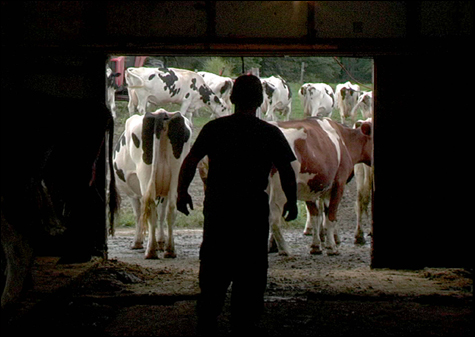
FARM BOY: Caught in a desperate act. |
Michael Chandler’s documentary, Knee Deep — which airs as part of PBS’s “Independent Lens” series on November 9 at 11 pm on New Hampshire Public Television (keep an eye out after Election Day for its appearance on Maine Public Broadcasting) — is less a whodunit than a who-wouldn’t-have-done-it. The film tells the story of an “attempted matricide” in rural Franklin County, as a young farmer tries to prevent his mother from selling the family farm. Joshua Osborne allegedly planned his crime with his friends and girlfriend, but to this day no one has confessed to it. Chandler’s yarn — of contradictory stories and inept scheming shadowed by the growth of urban sprawl and its threat to the rural work ethic — is curious, entertaining, and endlessly fascinating. We interviewed Chandler over e-mail as he recovered from a stomach flu.Knee Deep’s most impressive achievement, to me, is how deep, ambiguous and fleshed-out its characters are. Often, filmmakers that tackle “quirky” characters (first one that pops to mind is Gates Of Heaven) are accused of looking down on them or exploiting their isolated lifestyle, but it would be difficult to make an argument for that in Knee Deep’s case. Were you concerned about these people coming off as caricatures? How did you navigate that possibility?
I think a filmmaker has two main responsibilities. One is to the audience, and that’s to tell a good story. The other is to those who make that story possible, the people who inhabit the film, and that’s to treat them fairly. This is a documentary, nobody’s getting paid to appear, everyone is giving their time to a project which, like the proverbial elephant, they only get to see a small part of. So they’re going on faith, and that faith is in you, as a filmmaker, to treat them with respect. And the two responsibilities are intertwined: if you deviate from the second, you hurt the first. The film has then become about you, not the story. What drew Sheila [Canavan, producer] and me originally to this particular story was the headline in the Press Herald: “Some In Town Support Man Accused of Shooting Mother.” The complexity and contradictions embodied in that one line were enough for a film, and that’s what we wanted to explore. One of my mentors a long time ago told me that unless I could feel empathy for a character, I had no business putting them in the film, and that’s stuck with me. In Forgotten Fires, an earlier film I made which dealt with black church burnings in the Deep South, I found en element of humanity in each person — including the Klansmen — that an audience could relate to. The simplest way to avoid condescension or exploitation is to remember that you are telling a story, and that each person’s role in the film is commensurate only with their ability to contribute to that narrative. So, for example, in Knee Deep, characters who at one point make us laugh with their involvement in a bizarre conspiracy show up later and make us feel the pain of the loss of the farm. If the story at a particular point is humorous, they come into play; if it’s tragic, they do as well. That’s the difference between caricature and character.
Did you have any hope of “solving” this attempted murder? When did it become clear that neither Josh nor Donna would confess?
We interviewed both Josh and Donna while they were incarcerated, so we didn’t hope for confessions, per se, but merely the re-telling of events as they believed them, or wanted others to believe them. The film presents three different versions of what happened that July day, and no single version is unbiased, including the prosecutor’s. We think this adds to the richness of the film, and we deliberately interweaved the re-tellings to emphasize the differences. I even re-watched Kurosawa’s masterpiece Rashomon, because the situation reminded me of the essence of his story: each person remembering events differently to put themselves in the best light. At one point I even had labels such as “The Woodcutter’s Version,” “The Lady’s Version,” but luckily changed them later to “The Girlfriend’s Version” and “The Farmer’s Version,” because the reference would have been just too obscure! So we deliberately leave the mystery ambiguous, but if you pay close attention to the events as they unfold, you’re aware that the events of that morning were only the climax, that it had been building for many days, with many participants, and with plenty of guilt to go around.